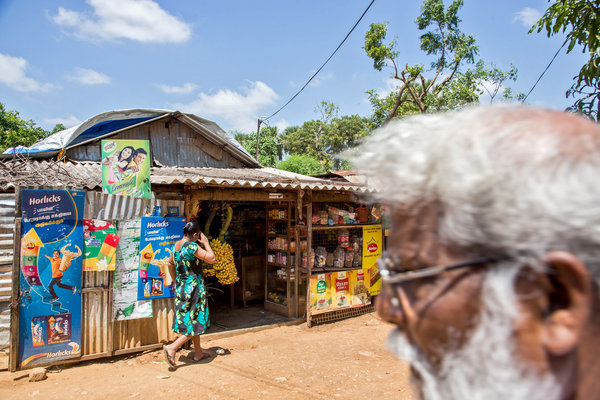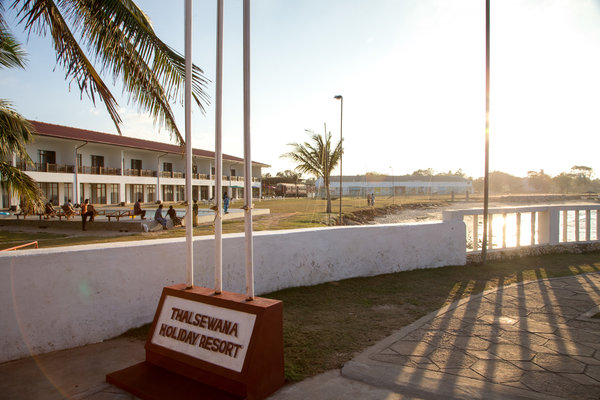
The Kannaki Camp in central Jaffna has housed displaced Tamil people since the Sri Lankan military seized their land. CreditGraham Crouch for The New York Times
Still, there are drawbacks to staying at Thalsevana Holiday Resort. Arrive without a reservation, and you could be arrested. Stroll too far down the beach during a blood-red sunset, and a soldier carrying an automatic weapon will appear out of a bunker, declare that you have entered a high-security zone and order you to turn around.
The resort’s website recommends ordering from the menu in advance — it does not say how far in advance — at the Palmyra restaurant, where “in addition to deferent style of choosing, you are offered Jaffna special dished that give you the real taste of Jaffna.” The waiters have suspiciously short haircuts and buff builds, and food not ordered in advance, while passable, tastes like it was cooked in a military canteen because, well, it was.

A resort hotel in Jaffna, run by the military, lies on property seized a quarter-century ago from thousands of still-displaced families.CreditGraham Crouch for The New York Times
And then there is the nagging ethical question of whether to enjoy a landscape seized a quarter-century ago in a bloody bombardment from thousands of still-displaced families.
“You visited my land? How did it look?” asked Arunachalam Gunabalasingam, 69, president of a committee of families from the area, none of whom have seen, or been paid, for their property since fleeing for their lives on June 15, 1990.
Two months have passed since President Mahinda Rajapaksa was defeated by Maithripala Sirisena, whose government quickly promised to free hundreds of minority Tamil detainees and return much of the land in the north and east that the military seized and continues to hold.
The promises created euphoria in dozens of refugee camps, but the giddy laughter has given way to impatience among some, anger in others, and an almost universal realization that the postwar reconciliation process here will not be brief or easy.
“Even in the best-case scenario, this is going to be a long and complicated process,” said Alan Keenan of the International Crisis Group in London.
A drive around Sri Lanka reveals that most of the military checkpoints that once pockmarked this island nation during its 30-year civil war, waged between rebels of the minority Tamil ethnic group and a government dominated by ethnic Sinhalese, are gone. But the pain from the tens of thousands of missing people and seized lands still throbs. Almost everyone has a story of loss, and only now are those stories being told in voices that rise above whispers. Roads and hotels are better, yet scars from bullets and bombs are apparent.
Perhaps most disquieting is that a vast surveillance infrastructure built up under the previous government, while quiescent now, remains largely in place. The military intelligence officers who once barged daily into villages in the north with questions about movements and visitors are not nearly as nosy or aggressive, but they still wander by. Gatherings in the north, even for a child’s birthday party, still require official permission.
And despite the present government’s promises to curtail the military’s intrusive presence in the civilian economy, military-run stores, resorts, factories, swimming pools and golf courses still operate.
In an interview in his office at Temple Trees, the Sri Lankan White House, Prime Minister Ranil Wickremesinghe vowed that Thalsevana and all of the military’s resorts would be sold or leased to private operators.
“You interested in running one?” Mr. Wickremesinghe joked in the interview.
Yet at Thalsevana, soldiers were still building a spacious new facility just down the beach from the original, which opened in 2010. At Marble Beach Resort near Trincomalee, an extensive staff of soldiers served only a few patrons, something that infuriates private hotel operators.
“No hotelier likes competing against the government,” said Suresh K. Shah, chairman of the Ceylon Chamber of Commerce. “They make their own rules, and their staff is free.”
Mr. Wickremesinghe replaced much of the army’s top leadership, but there is widespread speculation that his relationship with the military is strained. The military’s commercial ventures on seized land provide officers not only with nice homes and vacations, but also with personal enrichment.
M. A. Sumanthiran, a prominent lawyer and member of Parliament for the Tamil National Alliance, said Mr. Wickremesinghe held a private meeting with top Tamil leaders recently and told the group that he needed time to bring in new military leaders.
“It looks like he’s fighting with the military,” Mr. Sumanthiran said.
In his interview, Mr. Wickremesinghe did not respond directly when asked whether military leaders were resisting his efforts. “There is a new army commander taking over, and he needs time to settle in,” he said.
Strains are also starting to appear among Tamils, with growing differences about how aggressively to confront the new government, which was elected with overwhelming Tamil support.
“All of the top Tamil leaders are fools,” Eswarapatham Saravanapavan, a Tamil member of Parliament and managing director of the Uthayan and Sudar Oli newspapers, said during an interview in which he repeatedly referred to the new prime minister as a “snake” who would not keep his promises to the Tamils.
With the quiet encouragement of some Tamil leaders, more than two dozen displaced families sneaked back onto their lands near Trincomalee on Jan. 9, the day after the election. The families built thatch huts using donated and well-worn materials. There was no electricity, drinking water or even a ready source of food, but all expressed great satisfaction with the barbed-wire fences delineating small parcels.
Asked why she would live in surroundings more squalid than the refugee camp she had left, Manguladevi Rasamanikam, 60, said simply: “This is our land.”
Whether it was truly her land was uncertain. The military bulldozed homes, trees and wells, removing crucial landmarks. Some Tamil leaders acknowledged that a massive survey effort was needed; others said the families would resolve any property questions themselves.
Her husband, Selappa Rasamanikam, barely moved. Suffering throat cancer, he had returned “for his ending,” Ms. Rasamanikam said. With them was their 32-year-old daughter, Routhika Mohanraj, one of the couple’s seven children. With one son dead in the civil war and another killed in a traffic accident, the couple must divide their property among the remaining five children.
As the only married daughter, Ms. Mohanraj was to get the first plot — and she had come to stake her claim. The other children would get land only if the military retreated further. Most of those displaced said solid homes, toilets, roads and schools would need to be rebuilt by the government — a giant effort. Then there are the 100,000 refugees in India who may soon be repatriated and will have their own claims.
The potentially explosive issue of detainees also looms. Earlier this month, the release of Jeyakumari Balendran, a Tamil activist who had been in custody without charge for a year, was seen as an important step toward reconciliation by the government. But the release late last year of a detainee named Vaira Vanathan did not evoke stirrings of hope.
Mr. Vanathan had been held since 1991 with no charges ever filed. Now mentally and physically disabled, Mr. Vanathan only vaguely remembered his years in custody, but he said he knew he had been tortured and forced into hard labor.
Tamil leaders worry that the military will refuse to release more detainees because their stories will provoke outrage.
“Once you start releasing people, things could quickly spin out of the government’s control,” said Bhavani Fonseka, a lawyer for detainee families. “Because there is nothing to stop these people from saying they were held for 25 years, they were tortured, and they saw this other person who is now dead. Those stories could implicate people holding high office in the present government.
“What happens then?”